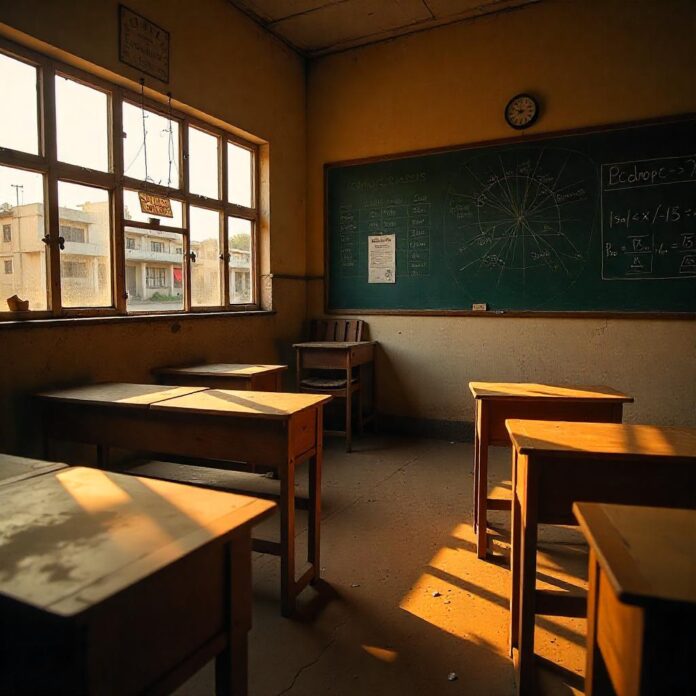The Unfolding Classroom Catastrophe
The corridors of Abuja’s public primary schools echo with a haunting silence. Since March 24, 2025, over 400 schools across the Federal Capital Territory’s six area councils—Abaji, Bwari, Gwagwalada, Kuje, Kwali, and Abuja Municipal—have stood empty, locked in an educational paralysis now stretching beyond 100 days. This isn’t just a temporary disruption; it’s the systematic dismantling of academic futures. Imagine 200,000 children—primarily from low-income families—waking to empty days instead of classrooms. The third-term academic calendar lies in ruins, with many pupils at risk of losing an entire academic year. For these children, education isn’t merely an opportunity; it’s their only ladder out of generational poverty. Keeping these children at home when they should be in school mutilates their future. The breaking point came from two betrayals: the failed implementation of the December 11, 2024 tripartite agreement mandating a ₦70,000 minimum wage, and the festering injustice of unpaid promotion arrears spanning eight years for primary teachers. While politicians commission flyovers and monuments, the foundations of Nigeria’s future—its classrooms—crumble in neglect.
Anatomy of a Crisis
This shutdown isn’t spontaneous—it’s the climax of years of institutionalized neglect. Rewind to January 2024: Teachers suspended an earlier strike after FCT Minister Nyesom Wike brokered a deal. He pledged the FCT would cover 40% of outstanding minimum wage arrears, while area councils would pay the remaining 60%. Teachers returned to classrooms in good faith. By September 2024, promises vaporized. Area councils defaulted on their 60% share, and peculiar allowances remained unpaid. The Nigerian Union of Teachers issued a 14-day ultimatum. When it expired silently, strike action resumed—now hardened by cynicism. The Association of Local Governments dismissed demands as not feasible, while FCT Universal Basic Education Board feigned ignorance of strike notices. Minister Wike’s response epitomizes the crisis: We are not owing; the Area Councils are owing. He deflects responsibility by citing full local government autonomy, despite approving funds for wage payments that never reached teachers. Meanwhile, area council chairmen insist teachers should wait three months for new ministers to settle in—a luxury children’s education cannot afford. This isn’t bureaucratic friction; it’s a calculated erosion of accountability. While officials shuttle between meetings, chalk gathers dust on unused blackboards.
Collateral Damage
Visit Kubwa or Gwagwalada on a weekday: You’ll see children hawking sachet water instead of solving equations. Parents voice the despair: My four children now roam the streets… Their father works outside Abuja. I can’t control them alone. For families without private school options, this strike is an academic death sentence. Nigeria already grapples with millions of out-of-school children—the highest globally. This shutdown could spike the projected dropout rate among vulnerable learners. Children are tomorrow’s future. Keeping them home when others learn breeds inequality. Behind the statistics are human beings. Teachers confess: We’re treated like second-class citizens. Secondary school colleagues earn ₦70,000 and get paid promotions. We survive on ₦30,000 with eight-year arrears. An internal survey reveals 86% of teachers battle depression linked to unpaid wages. Non-teaching staff now stand in solidarity—ordered to join the strike. This isn’t greed; it’s survival. As inflation shreds purchasing power, teachers choose between dignity and starvation.
Wage Apartheid
The strike’s roots dig into soil fertilized by systemic discrimination. Consider the brutal contrast: Primary teachers struggle with ₦30,000 minimum wage versus ₦70,000 for secondary counterparts. Promotions remain unimplemented for five to eight years for primary staff while secondary colleagues receive regular processing. Salary payments show erratic delays exceeding 36 months versus on-schedule disbursements. Peculiar allowances totaling ₦8 billion remain pending. Where does the money go? In 2025, FCT’s budget allocated significant portions to education—yet nothing addressed primary teacher arrears. Infrastructure funds bypass staff welfare. Council chairmen claim paying teachers is not feasible while presiding over councils with opaque finances. This isn’t fiscal constraint; it’s a values crisis. Officials build flyovers while schools shut. Who are the roads for—the unschooled?
Pathways to Resolution?
In June 2025, a proposal emerged replicating 2024’s failed formula: FCT covers 40% of arrears, councils pay 60%. Area councils again rejected it. As leverage, authorities threaten to withhold internally generated revenue allocations—a move risking further service paralysis. Security-brokered talks with student groups yielded a temporary protest pause, but the teachers’ union trust is exhausted. Concrete actions, not assurances, their secretary insists after eight failed dialogues. With non-teaching staff joining the strike, the crisis deepens. Following a symbolic classroom protest at a minister’s residence, stakeholders announced meetings to finalize reopening modalities, though skepticism remains high given previous unmet commitments.
A Nation’s Future in the Balance
This classroom paralysis transcends a labor dispute. It mirrors foundational injustice: leaders who prioritize concrete over cognition, monuments over minds. Every day silent schools stand locked, 200,000 dreams dim—potential doctors, engineers, presidents trapped in a system that devalues their promise. The solution isn’t complex, but it demands courage: Release withheld funds directly to teachers, bypassing council bottlenecks. Amend the constitution to federalize primary education funding, ending local gatekeeping. Recognize that education is the most powerful weapon to change the world—and fund it accordingly. Until then, Abuja’s silent schools remain tombstones over the grave of educational justice. The chalk dust settling on unused blackboards writes its own epitaph: Here lies a future murdered by indifference. They crash food prices to punish farmers… crash education hopes to punish the poor.


